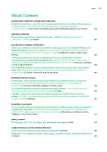Diabetes mellitus and cognitive disorders from the diabetologist’s perspective
Authors:
Alena Šmahelová
Authors‘ workplace:
III. interní gerontometabolická klinika LF UK a FN Hradec Králové
Published in:
Vnitř Lék 2017; 63(10): 717-720
Category:
Reviews
Overview
Diabetes mellitus is associated with cognitive impairment which may convert to vascular or neurodegenerative dementia. Impairment of cognitive functions affects patients with type 1 and especially type 2 diabetes, with a number of vascular, metabolic and psychosocial factors involved in its development. As hyperglycemia and hypoglycemia also play an important role, important is the correct strategy of diabetes therapy which utilizes a combination of metformin with modern safe antidiabetics (incretin drugs, gliflozins, insulin analogues). It seems that some antidiabetic drugs (metformin, incretin drugs) and nasal form of application of insulin could improve cognition in diabetics.
Key words:
antidiabetic drugs – diabetes mellitus – hyperglycemia – hypoglycemia – cognition
Sources
1. Feinkohl I, Price JF, Strachan M et al. The impact of diabetes on cognitive decline: potential vascular, metabolic, and psychosocial risk factors. Alzheimers Res Ther 2015; 7(1): 46. Dostupné z DOI: <http://dx.doi.org/10.1186/s13195–015–0130–5>.
2. Seaquist E. The Final Frontier: How Does Diabetes Affect the Brain? Diabetes 2010; 59(1): 4–5. Dostupné z DOI: <http://dx.doi.org/10.2337/db09–1600>.
3. Kawamura T, Umamura T, Hotta N. Cognitive impairment in diabetic patients: Can diabetic control prevent cognitive decline? J Diabetes Investig 2012; 3(5): 413–423. Dostupné z DOI: <http://dx.doi.org/10.1111/j.2040–1124.2012.00234.x>.
4. Cukierman-Yaffe T, Gerstein HC, Williamson JD et al. Relationship between baseline glycemic control and cognitive function in individuals with type 2 diabetes and other cardiovascular risk factors: the action to control cardiovascular risk in diabetes-memory in diabetes (ACCORD-MIND) trial. Diabetes Care 2009; 32(2): 221–226. Dostupné z DOI: <http://dx.doi.org/10.2337/dc08–1153>.
5. Viberti G, Kahn SE, Greene DA et al. A Diabetes Outcome Progression Trial (ADOPT). An international multicenter study of the comparative efficacy of rosiglitazone, glyburide, and metformin in recently diagnosed type 2 diabetes. Diabetes Care 2002; 25(10): 1737–1743.
6. Patel A, MacMahon S, Chalmers J et al. [The ADVANCE Collaborative Group]. Intensive Blood Glucose Control and Vascular Outcomes in Patients with Type 2 Diabetes. N Engl J Med 2008; 358(24): 2560–2572. Dostupné z DOI: <http://dx.doi.org/10.1056/NEJMoa0802987>.
7. Whitmer RA, Karter AJ, Yaffe KF et al. Hypoglycemic Episodes and Risk of Dementia in Older Patients With Type 2 Diabetes Mellitus. JAMA 2009; 301(15): 1565–1572. Dostupné z DOI: <http://dx.doi.org/10.1001/jama.2009.460>.
8. De Pablos-Velasco P, Bradley C, de Pablos-Velasco E et al. The PANORAMA an-European Survey: impact of severe and non-severe hypoglycaemia on quality of life and other patient reported outcomnes in patient with type 2 diabetes (Abstract 580). Diabetologia 2010; 53(Suppl 1): S234-S236.
9. Inzucchi S, Bergenstal R , Buse J. Management of Hyperglycemia in Type 2 Diabetes, 2015: A Patient-Centered Approach: Update to a Position Statement of the American Diabetes Association and the European Association for the Study of Diabetes. Diabetes Care 2015; 38(1): 140–149. Dostupné z DOI: <https://doi.org/10.2337/dc14–2441>.
10. Alagiakrishnan K, Sankaralingam S, Ghosh M et al. Antidiabetic Drugs and Their Potential Role in Treating Mild Cognitive Impairment and Alzheimer’s Disease. Discov Med 2013; 16(90): 277–286.
11. Hunter K, Holscher C. Drugs developed to treat diabetes, liraglutide and lixisenatide, cross the blood brain barrier and enhance neurogenesis. BMC Neurosci 2012; 13 : 33. Dostupné z DOI: <http://dx.doi.org/10.1186/1471–2202–13–33>.
12. Yang Y, Zhang J, Ma D et al. Subcutaneous administration of liraglutide ameliorates Alzheimer-associated tau hyperphosphorylation in rats with type 2 diabetes. J Alzheimers Dis 2013; 37(3): 637–648. Dostupné z DOI: <http://dx.doi.org/10.3233/JAD-130491>.
13. Salcedo I, Tweedie D, Li Y et al. Neurtoprotective and neurotrophic actions of glucagon-like peptide-1: an emerging opportunity to treat neurodegerative and cerebrovascular disorders. Br J Pharmacol. 2012; 166(5): 1586–1599. Dostupné z DOI: <http://dx.doi.org/10.1111/j.1476–5381.2012.01971.x>.
14. Duarte AI, Candeias E, Correia G et al. Crosstalk between diabetes and brain: Glucagon-like peptide-1 mimetics as a promising therapy against neurodegeneration. Biochim Biophys Acta 2013; 1832(4): 527–541.Dostupné z DOI: <http://dx.doi.org/10.1016/j.bbadis.2013.01.008>.
15. Craft S, Baker LD, Montine TJ et al. Intranasal insulin therapy for Alzheimer disease and amnestic mild cognitive impairment: a pilot clinical trial. Arch Neurol 2012; 69(1): 29–38. Dostupné z DOI: <http://dx.doi.org/10.1001/archneurol.2011.233>.
Labels
Diabetology Endocrinology Internal medicineArticle was published in
Internal Medicine

2017 Issue 10
-
All articles in this issue
- Medication adherence to non-vitamin K antagonist oral anticoagulants at non-valvular atrial fibrillation – the literature review
- Surgical treatment of aortic root aneurysm: comparison of Bentall procedure and David reimplantation of aortic valve
- Treatment strategy of type 2 diabetes used in Czech Republic after metformin therapy failure
- Issues related to secondary osteoporosis associated with growth hormone deficiency in adulthood
- Is it possible to improve long-term compliance of patients to statin therapy?
- COSYREL – an efficient fixed combination for treatment of hypertension, stable ISHD and heart failure
- The benefit of new angiogenesis (bevacizumab and aflibercept) inhibitors for multiple angiomatosis therapy: a case report
- Endocrine orbitopathy: the present view of a clinical endocrinologist
- Faster Insulin Aspart – a new prandial insulin analogue
- Intestinal adaptation following gut resection
- Osteoarthritis as part of metabolic syndrome?
- Metabolic syndrome and the role of the polypill in the prevention of its complications
- Diabetes mellitus and cognitive disorders from the diabetologist’s perspective
- Gliflozins slow down the progression of diabetic kidney disease
- Physical activity – the Holy Grail of modern medicine?
- Internal Medicine
- Journal archive
- Current issue
- Online only
- About the journal
Most read in this issue
- COSYREL – an efficient fixed combination for treatment of hypertension, stable ISHD and heart failure
- Surgical treatment of aortic root aneurysm: comparison of Bentall procedure and David reimplantation of aortic valve
- Physical activity – the Holy Grail of modern medicine?
- Endocrine orbitopathy: the present view of a clinical endocrinologist
